Review of Battle Of The River Plate
Introduction
In the early days of World War II when it became apparent that Britain wasn`t going to capitulate to the Nazis as easily as the rest of Europe had yielded, the Nazi strategy turned to keeping the British Isles isolated and starved of resources. For a nation that couldn`t adequately feed itself, the sea was a vital lifeline, which the German Navy moved quickly to contain. The havoc wreaked by the infamous U-Boats on merchant shipping is well documented, but in the first few months following the declaration of war, German strategy also included the pocket battleship.
The Admiral Graf Spee was one of these heavily armed and swift hunters. Both she and her supply ship Altmark were on station prior to the outbreak of war, and alone accounted for nine merchant vessels lost in the southern Atlantic and Indian Oceans. This situation was of course untenable for Britain, so under Commodore Harwood, HMS Ajax, HMS Exeter and HMNZS Achilles were sent to hunt the Graf Spee down. This film chronicles the rather astounding events that led to the defeat of the Admiral Graf Spee.
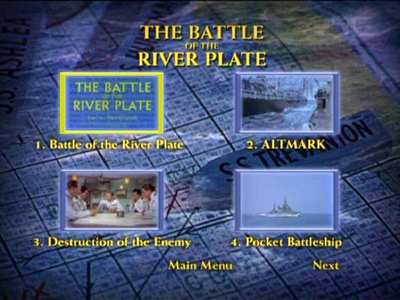
Video
Once again Carlton does a great job in restoring an old British film made in 1956 by Rank. The Battle of the River Plate is presented in a 1.66:1 letterbox ratio on this disc and the picture is in very good condition considering the age. The image is by and large sharp, clear and colourful, and shows of some of the breathtaking location photography to good effect. The aspect ratio is problematic for my set as zooming in loses picture information from the top and bottom, but watching the letterbox picture is wholly unsatisfying. We`re used to black bars at the top and bottom for a 2.35:1 picture, what`s wrong with bars at the sides on an anamorphically enhanced 1.66:1 ratio picture. There`s probably a technical reason somewhere.
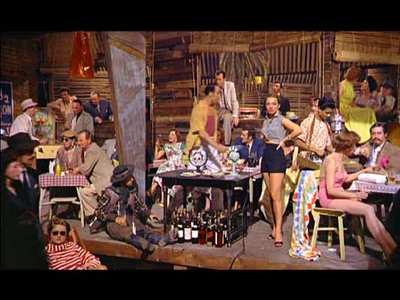
Audio
The sound is the simple DD 2.0 mono track that usually accompanies films of this vintage. The sound is adequate with the dialogue clearly audible. The music is rather hackneyed though. Subtitles are supplied for your pleasure.
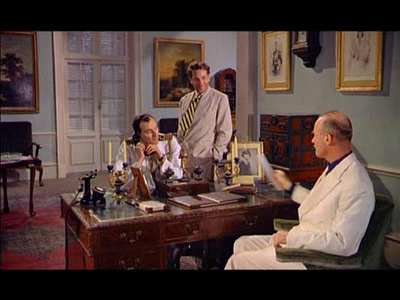
Features
Cast biographies are available on director Michael Powell, and stars John Gregson, Peter Finch and Anthony Quayle.
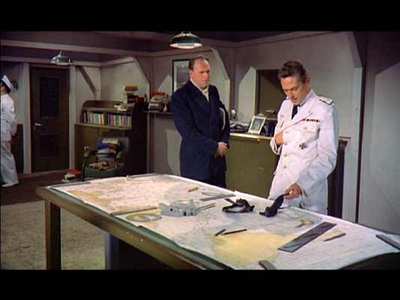
Conclusion
Stiff upper lips ahoy! The Battle of the River Plate is a rather dry and dated account of an interesting event of World War II. Clichés abound as we are introduced to a group of horrendously stereotyped characters that relate a story rendered completely unrealistic by the performances of the cast. Having said that, The Battle of the River Plate is undoubtedly a product of the times, and if you are familiar at all with the vernacular of the 1950s then it is possible that you will be able to enjoy this film.
I however found the characters dull and tiresome, the way that the story was dryly related meant that there was no drama or tension to be found, sorely lacking in a war drama. From the moment the film started, and the Graf Spee sank the Africa Shell, we were introduced to the stereotypical Brit played by Bernard Lee. Taken captive aboard the German battleship, he amiably protested his treatment then proceeded to converse in the most pleasant of tones with the German Captain Langsdorff played by Peter Finch. This was the clichéd arrogant German commander, who politely revealed all his plans and concluded with a "For you the War is over" before offering him a tour of his vessel.
The British contingent was even worse. The officers of the fleet sent to pursue the Graf Spee are all portrayed as awfully upper class, with just a hint of a non-BBC accent creeping in the ordinary seamen. The officers refer to each other with pet nicknames that all end in IE, Squiffie or Staffie or Hookie or something equally ridiculous. Anthony Quayle plays Commodore Harwood, the commander of the fleet sent to hunt down the German battleship, and I cannot overstate just how camp this character is in his horrific grey fright wig. The rest of the cast aren`t much better, displaying a British reserve and upper lips so stiff that even under the heaviest of bombardment, the slightest emotion is ruthlessly quelled. "Oh Dear! That last shell seems to have blown my legs clear off, time for a round of golf anyone?" At best this film is notable for appearances from Patrick MacNee (as Flopsie or even Mopsie but definitely not Cottontail) and Christopher Lee as Uruguayan bar owner.
On second thoughts, I`m not going to excuse this film as a product of its times. Even in the fifties, commendable stories about the Second World War were being told, films with interesting characters, and filled with drama and above all guaranteed to keep you at the edge of your seat. The Battle of the River Plate fails miserably in all regards. Any characterisation is missing, and despite the excellent visuals, action isn`t forthcoming.
It`s an amazing shame, as the events of the Battle of The River Plate make for exciting reading. A pitched battle between the Graf Spee and three British vessels is halted when the German vessel makes for the neutrality of Uruguay. What follows is a diplomatic and intelligence tour de force that results in the Graf Spee`s ultimate fate. If I tell you that three days after the events depicted in this film, the Captain of the Graf Spee committed suicide, you would find it hard to reconcile it with the character portrayed here.
Some honest characterisation and a more emotionally vibrant script would have made this a classic WWII story. As it is, the clichés and stereotypes just make for a laughable tale. One to avoid.
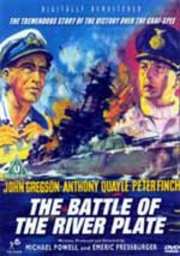




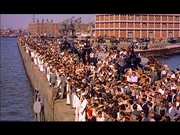
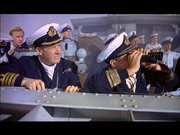
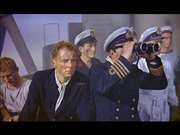
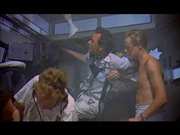
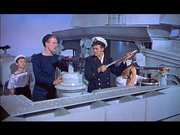
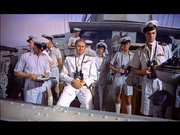
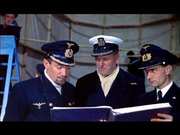
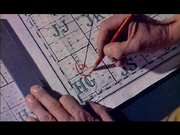
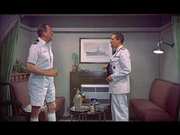
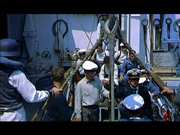
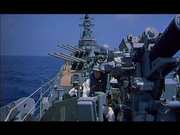
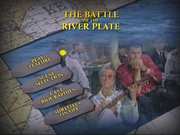
































Your Opinions and Comments
Be the first to post a comment!